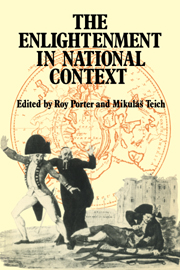Book contents
- Frontmatter
- Contents
- Preface
- 1 The Enlightenment in England
- 2 The Scottish Enlightenment
- 3 The Enlightenment in France
- 4 The Enlightenment in the Netherlands
- 5 The Enlightenment in Switzerland
- 6 The Italian Enlightenment
- 7 The Protestant Enlightenment in Germany
- 8 The Enlightenment in Catholic Germany
- 9 Reform Catholicism and Political Radicalism in the Austrian Enlightenment
- 10 Bohemia: From Darkness into Light
- 11 The Enlightenment in Sweden
- 12 The Russian Enlightenment
- 13 Enlightenment and the Politics of American Nature
- Afterword
- Notes to the text
- Further reading
- Index
2 - The Scottish Enlightenment
Published online by Cambridge University Press: 24 September 2009
- Frontmatter
- Contents
- Preface
- 1 The Enlightenment in England
- 2 The Scottish Enlightenment
- 3 The Enlightenment in France
- 4 The Enlightenment in the Netherlands
- 5 The Enlightenment in Switzerland
- 6 The Italian Enlightenment
- 7 The Protestant Enlightenment in Germany
- 8 The Enlightenment in Catholic Germany
- 9 Reform Catholicism and Political Radicalism in the Austrian Enlightenment
- 10 Bohemia: From Darkness into Light
- 11 The Enlightenment in Sweden
- 12 The Russian Enlightenment
- 13 Enlightenment and the Politics of American Nature
- Afterword
- Notes to the text
- Further reading
- Index
Summary
By the 1760s Scotland had become a centre of learning and letters of international importance. The universities of Edinburgh, Glasgow and Aberdeen employed some of the most admired philosophers and scientists in the contemporary world. The classrooms of Adam Smith and John Millar at Glasgow, Adam Ferguson and Dugald Stewart at Edinburgh and the medical professors of Edinburgh attracted students from every corner of the Continent and the Anglo-Saxon world. Edinburgh was the hub of this intellectual universe. Although the Act of Union of 1707 had meant the abolition of the Scots parliament and Privy Council the city was to remain the effective centre of Scottish political and social life until the early nineteenth century. Its law courts, churches and college; its academies, improvement societies and theatres; its salons and taverns, supported a large and complex society of men of letters whose members were drawn from the ranks of the local professions and from the landed elite around which the social and political life of the country revolved.
Tobias Smollett's Matthew Bramble enthusiastically described Edinburgh as ‘a hot-bed of genius’ but his contemporaries generally preferred a more measured metaphor. The painter Allan Ramsay, one of the leading members of the city's literati in the early 1750s, had described Edinburgh as ‘the Athens of Britain’,
Where instead of the awkward and monkish pedantry of the old-fashioned Universities, young gentlemen will be initiated in the principles of usefull knowledge and at the same time exercised in all these liberal accomplishments which qualify a man to appear in the distinguished spheres of Life.
- Type
- Chapter
- Information
- The Enlightenment in National Context , pp. 19 - 40Publisher: Cambridge University PressPrint publication year: 1981
- 48
- Cited by



